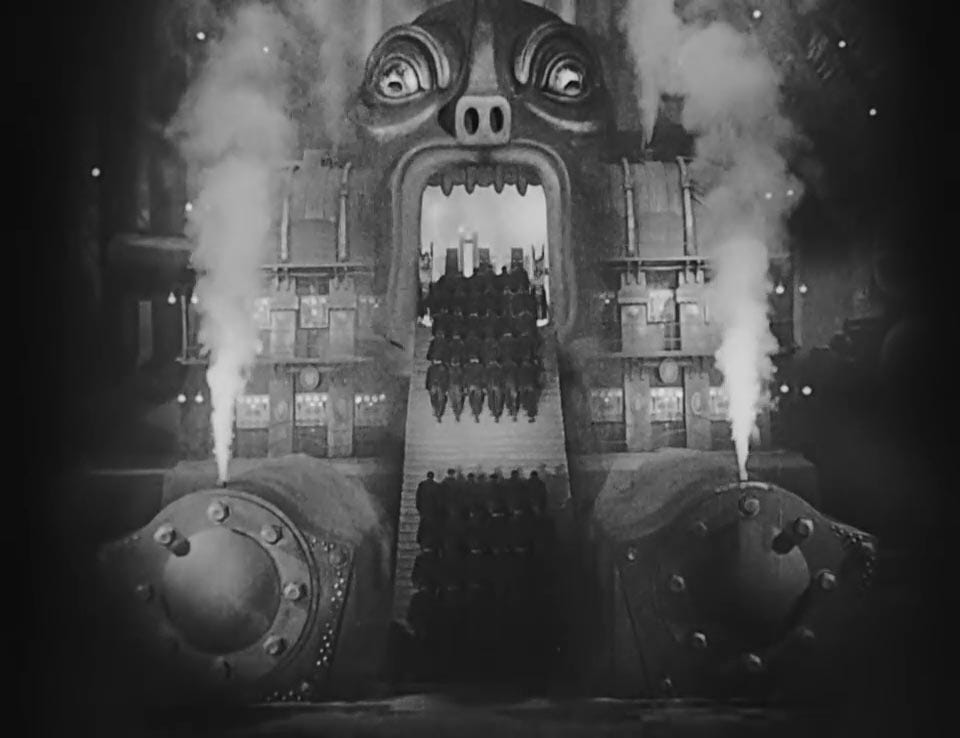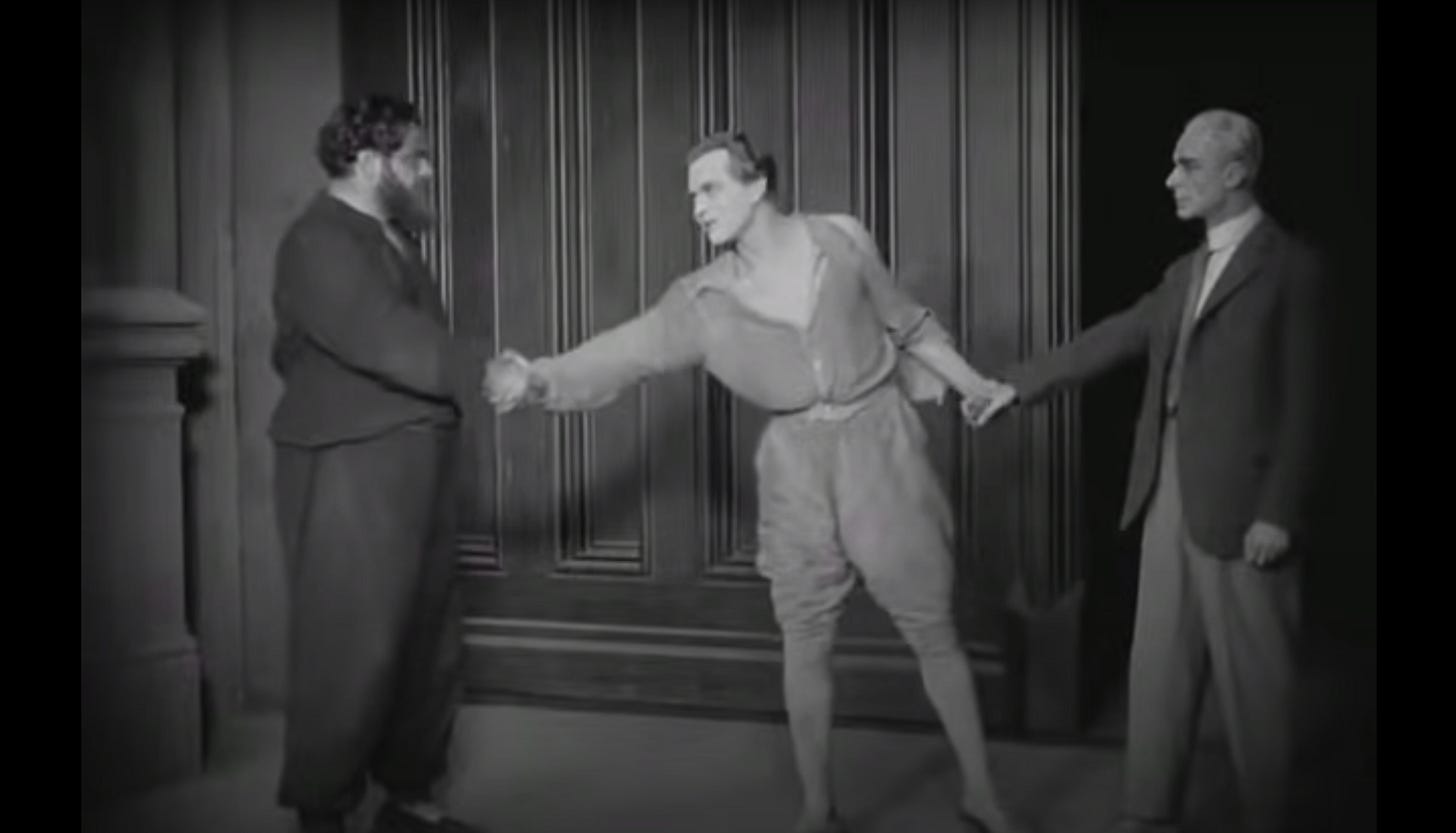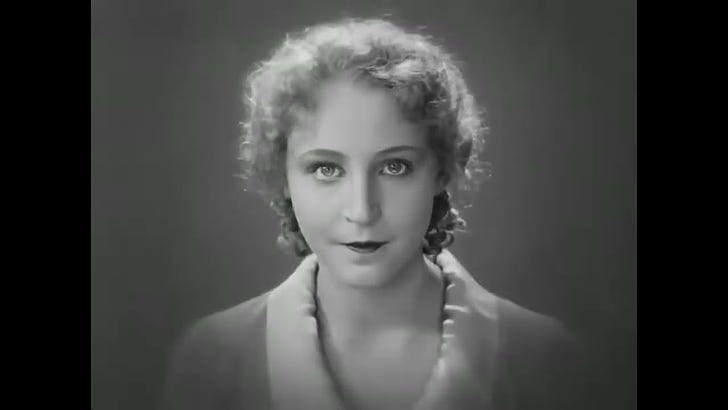The Mediator Between The Head And The Hands Must Be The Heart
An Essay on Translation, "Metropolis" and Heart Space
I originally shared this essay in April 2024 to my paid subscribers, which marks the genesis of my journey to re-translating Thea von Harbou’s “Metropolis”. As I prepare to make the entire book available for free on Substack, it seems right to share this essay with everyone for those interested in learning more about why I’ve been taking on this project in the context of our current social and political climate.
If you’d like more direct details about the project and to see which chapters are already available, you can head to the essay below:
I’ve been spending a lot of time with “Metropolis” lately - both with the 1927 film as well as the 1925 novel edition in its original German version and its English version. There is an epigraph at the beginning of the book from the author, Thea von Harbou, which says a lot about the nature of the film. I was surprised to find that the original German epigraph wasn’t translated for the English novel in quite the way I would have expected. In German, it reads:
Dieses Buch ist kein Gegenwartsbild. Dieses Buch ist kein Zukunftsbild. Dieses Buch spielt nirgendwo. Dieses Buch dient keiner Tendenz, keiner Klasse, keiner Partei. Dieses Buch ist ein Geschehen, das sich um eine Erkenntnis rankt: Mittler zwischen Hirn und Händen muß das Herz sein.
The English version of the novel translated it as such:
This book is not of today or of the future.
It tells of no place.
It serves no cause, party or class.
It has a moral which grows on the pillar of understanding:
"The mediator between brain and muscle must be the heart."
I find this to be an… okay translation: It does get the meaning across, however it does feel slightly too derivative in some places (“It has a moral which grows on the pillar of understanding”), and perhaps too literal in others (“The mediator between brain and muscle”). I had a go at re-translating it myself, and came up with the following:
This book is not a picture of the present. This book is not a picture of the future. This book is not set anywhere we know. This book serves no political leaning, no class, no party.
This book tells of an event which grows around a realization - that the mediator between the head and the hands must be the heart.
To me, this is far closer literally to the German translation while still being enjoyable to read in English. For the last line, I went for an almost identical translation to the one used by the English version of the film - going with the literal translation of “hands” for “Händen”, but switching to “head” rather than the literal translation of “brain” for “Hirn”. While in context the meaning is pretty much identical, it allows the alliteration of the three H’s to be preserved in English, keeping this poetic element the original German line had that gives it a nice flow and ring when reading it.
Having an accurate translation of this last line is critical: it’s one of the most important lines in “Metropolis”, repeated by numerous characters at numerous points. The film in particular makes a big deal out of it, being the final line that the film ends on.
Today, I want to use this piece to talk about this very idea of heart space. It seems that the heart and its domain of “feeling” is being pushed aside in favour of focusing on purely the “thinking” and the “doing”, as it pertains to a broader context difficulties I see society currently grappling with. I’ll be pulling on some of the ideas from “Metropolis” in examining this, and hopefully show why it is that the mediator between the head and the hands really must be the heart.
And yes, some spoilers for Metropolis are involved. Seeing as the whole film is available for free online, it makes sense to watch it first if you haven’t already, then to continue on.
When It’s Better To “Feel” Rather Than “Think”
A while back, I was reading Carl Jung’s memoirs, “Memories, Dreams, Reflections”, which contained the following passage recalling an encounter with a chief from a Native American tribe, on his visit to the States:
He was the chief of the Taos Pueblos, an intelligent man between the ages of forty and fifty. His name was Ochwiay Biano (Mountain Lake). I was able to talk with him as I have rarely been able to talk with a European. […]
“See,” Ochwiay Biano said, “how cruel the whites look. Their lips are thin, their noses sharp, their faces furrowed and distorted by folds. Their eyes have a staring expression; they are always seeking something. What are they seeking? The whites always want something; they are always uneasy and restless. We do not know what they want. We do not understand them. We think that they are mad.”
I asked him why he thought the whites were all mad.
“They say that they think with their heads,” he replied.
“Why, of course. What do you think with?” I asked him in surprise.
“We think here,” he said, indicating his heart.
A modern condition of our existence, at least in the West, seems to be that everything about our experience can be understood purely through concentrating on the brain, or “head”, alone. Growing up, my formal education certainly seemed to carry this idea through subliminally, and perhaps more overtly in my spell at dental school. But, more and more, it made less and less sense to me. What of the visceral sensation in my gut at fear or injustice? What of the aching of my heart in times of loss and desperation? All the academic rationalisations did not come close to actually elucidating the human experience, as I was embodying it; the “it’s all in the head” generalisation did not satisfy me. And it seemed not to have satisfied Jung either, which is perhaps why he goes on to describe this conversation as:
“the first time someone had drawn for me the picture of the real white man. […] This Indian had struck our vulnerable spot, unveiled a truth to which we are blind.”
I’m sure many of you reading this can recall times in your life when either yourself or someone close to you has been going through something difficult, and you’ve ended up in an emotional conversation with someone about it. Did you, or that other person, need someone to tell you about all the ways in which you might or might not be rationalising this scenario, what was happening with your brain chemistry, the risk-benefit calculations of the different options you could take? Or did you instead need someone just to hold a space for you, with an open heart, and to let them know that you were hearing them and feeling them?
The Role of The Heart
To me, prioritising the “head” over other parts of the body in understanding our experience does a great disservice to the quality of our being. Indeed, I see the current situation that many Western nations find themselves in - of citizens acting in service of the government and their political whims, rather than having a government that serves them - as a symptom of how we have conceptualised the body. We have a disconnect between what the “head” wants to do and is doing, and the desires and struggles of the populous (and within the populous!). As a result we foster this “us vs them” attitude that seems to have permeated every aspect of our culture.
“Metropolis” predicted this exact society to a tee.
A central theme of the film is the loss of humanity that has occurred in both the working classes and the upper classes, who, as a result, both fail to realise that one another are still “brothers”. What stands it apart from other films with dystopian and revolutionary themes, however, is in how it treats these two divisions of society. We’re shown that the “heads” of society are completely out-of-touch with the needs of the workers, and are putting them through unnecessary suffering and pain simply to support their own vices and indulgences. And the film makes extensive use of slave imagery and interweaving the story of the Tower of Babel to signify this.

Where the film particularly stands apart from its contemporaries is that it doesn’t then put the “hands” of the machine on a pedestal, and have them be the saviours of the day as so many other films do. Rather, in their conception of the “problem”, and how they act in relation to it, they contribute further to the conditioning that they find themselves in. Through the outsourcing of their individual sovereignty to the “machine”, and subsequently, in their hero-worship and idolising of Maria to bring them salvation from the machine (exploited to instigate revolution), they cause far more destruction and pain than they intended. They become so caught-up in their desire to “stick it to the man” and to blame a scapegoat that they forget their own humanity; they leave their children and leave them to drown in the underground city as it falls apart. It is left to Freder - the heir to the current leader of Metropolis - to rescue the children, alongside Maria - the very person they idolised.
While chaos ensues in both the underground city and in the luxurious metropolis above, neither the “head” nor the “hands” are ultimately victorious. The revolution by the underground workers ultimately fails and the heads are still left standing. But, likewise, the heads, who tried to engineer the crisis to give them an excuse to clamp down on the workers and enslave them further, also suffer great loss. Joh Fredersen, the head of Metropolis, and Grot, the worker’s foreman, are left awkwardly regarding each other and not knowing what to do. They realise the only way society can move forward for the better is if they work together, but through an engrained “us vs them” culture, they find themselves unable to do so. It thus takes Freder, representing “heart” and understanding the world of the “head” and the world of the “hands” (and beyond!) - to be a “mediator” and join the two forces’ hands.

In the film’s story and final message, there is still a place for the “head”, of society. This is mirrored biologically; we would not have a “head” if we didn’t need one. It is what allows us to navigate the terrain that we find ourselves in as part of our moment-to-moment experience. And, of course, we need “hands” to interact directly with that terrain in service of our being. But we need a heart to know how to treat the terrain with respect, to feel where our place within it lies. It takes a heart to translate that between “head” and “hands”.
Moving To Heart Space
In an age where we are seeing both a political elite leveraging the lives of ordinary people to fulfil their own agendas, as well as workers who to overthrow the parasitical “world order” that is emerging, Metropolis reminds us the ultimate victim of the culture has been our humanity, and the loss of access to our heart space to recognise that humanity in others. We need a hierarchy that gives some power to a head, but also “hands” to keep the hierarchy maintained. But more than all of those we need a way for those to adequately communicate to each other, and to translate each others needs. This, I feel, is the next step in the evolution of civilisations: a reminder that, in spite of all our technological advances and breakthroughs, the mediator between the head and the hands must, still, be the heart. It’s the key in moving from a framework of “battling” to a framework of “building”.
And, through many generations, we have been provided multiple pathways to accessing our heart space. Jung’s work has certainly found a pathway to contextualising this, but so has millennia of tribal and spiritual wisdom in meditative practises, shadow and soul work, and much more. So I’d like to turn this over to you, and ask what some of your practises and successes in moving in to heart space are, and what its done for you. And if you don’t have any you can name, maybe there’s a memory you have of where you felt very heart-centred in your approach to a problem, and that the outcome ended up being favourable. I’d be keen to hear that too.
With gratitude,
Tom









